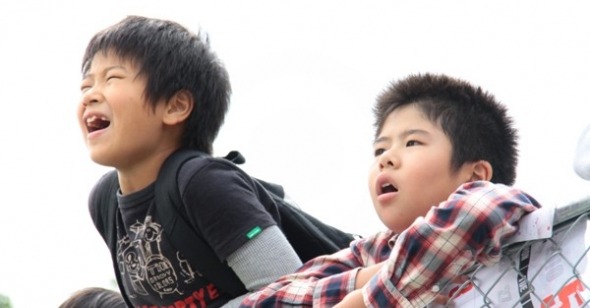Bright Future
By Michael Koresky
I Wish
Dir. Hirokazu Kore-eda, Japan, Magnolia Pictures
Midway through Hirokazu Kore-eda’s I Wish, a grandfather grumpily wonders, “Do kids today feel anything about anything?” Judging by this enchanting and wise film, indeed they do. Twelve-year-old Koichi and his younger brother Ryu care deeply—for their parents, for their friends, for another. So much so on this last count that the boys, separated by hundreds of miles on Japan’s southern island of Kyushu, journey a great distance, unbeknownst to their divorced parents, so that they can meet, and then wish for their ultimate reunion. Their belief, shared by a ragtag group of school chums, is that if they shout out their wishes at the very moment that two bullet trains (based on the real Shinkansen railway that began running across Japan in March 2011) pass each other at high speed, the energy produced will make their dreams come true. Grandpa is wrong: for these children, as it is for all kids, life is all feeling.
No diagnosis of the apathy of contemporary youth, this: I Wish is a rush of good tidings, a tale of connection in an age of alleged disconnection. It’s reaffirming without sacrificing authenticity, and without diluting its profound core of melancholy. Played by real-life brothers Koki Maeda and Ohshiro Maeda, Koichi and Ryu are lovely and noble protagonists, refreshingly lacking in the self-centeredness that fuels so many of the narratives we watch. Kore-eda, who already proved himself a delicate extractor of performances from underagers in 2005’s Nobody Knows (its preteen star, Yuya Yagira skipped away with the Best Actor award at Cannes), gives them a remarkable amount of space to breathe—and to just be. Watching I Wish, one realizes how boxed in and over-directed most child performances are. While the Maeda boys are clearly enlisted to push forward a tightly scripted narrative, Kore-eda allows scenes to unfold at such a naturalistic, leisurely pace that often we feel we’re eavesdropping. There’s a particularly marvelous shot of Ryu simply sitting in his bedroom, reading a comic book; his genuine, giggly enjoyment is impossible to fake (one imagines that the director set up a camera with little Ohshiro Maeda to capture the kid in his natural habitat and just waited). With its hanging-out rhythms, the film most resembles Nobody Knows in Kore-eda’s oeuvre; but it plays also as an antidote to that true-life story, which took a wrenching tragic turn. I Wish is about redemption, finding it not in the grand gestures but in every day kindnesses.
Despite the ever-present, and quite lovely, image of the volcano that looms over the town in which Koichi lives, there is no eruption of sadness; it lays dormant. This is a tale of two children who have already learned to accept the realities of their parents’ divorce. Koichi lives with his well-meaning, neurotic mother and grandparents in Kagoshima; far to the north from there, in Hakata, Ryu resides with his father, the self-centered front man of an indie pop band. Neither parent is wholly chastised by the filmmaker (they are a world away from the monstrously selfish mommy played by You in Nobody Knows), but their subtly neglectful behavior provides clues to the family’s core of unhappiness: dad Kenji (Joe Odagiri) takes advantage of Ryu’s impish energy, flattering him by letting him hang out with his fellow musicians, but also treating him like a groupie; mother Nozomi (Nene Ohtsuka) is adept at keeping the family humming along, but her drunken late-night phone call to Ryu hints at deeper levels of disconnection. Despite such parental malfunctions, Koichi and Ryu remain polite, sweet kids, and Kore-eda seems to want us to not worry about their futures. Even in the film’s one flashback to a family dinner that devolves into a bout of violent meatball throwing between mom and dad, Kore-eda foregrounds the brothers’ remarkable resilience—no tantrums or tears, just stares communicating that this too shall pass.
Chubby, beetle-browed Koichi and lithe, sprightly Ryu cut such wonderfully complementary figures that it’s unfortunate they’re not allowed to share more screen time. But that absence is at the heart of I Wish, which is about empty spaces as much as any of Kore-eda’s films. Kore-eda’s most acclaimed work—Maborosi (1994), After Life (1999), Nobody Knows, and Still Walking (2008)—are all films ultimately about death, and, perhaps more importantly, the spaces those deaths open up as loci of contemplation in the living world. I Wish breaks from that tradition somewhat: with the exception of the poor pooch of one of Koichi’s friends, I Wish is about a different sort of loss—the past, the place you cannot return to. Koichi and Ryu’s wishes are not simply to be reunited but to return to an unbroken world.
Yet Kore-eda doesn’t wallow in despair in his assertion that such a journey may be impossible. The optimism of I Wish is in fact startling; this is, after all (despite its occasionally cloying and childish lite pop-rock music cues), a film for adults about kids, a type of film that often feels more like a pointed cautionary tale; call it the anti–White Ribbon. Late in the film, when the kids unburden themselves of their dreams and desires, Kore-eda finally lets forth an explosion—a remarkable montage of images, frenetic yet peaceful, describing the textured universe of a child, toys and sweets, symbols of love and friendship. It’s one of Kore-eda’s most forthrightly poetic moments, like a bottle of memories has been uncorked. Perhaps this is when they learn to put away childish things, after casting them to the wind. As communicated in a final shot of Koichi peering over his sunny balcony with wistfulness and hope, it’s time to look forward.
